Search
Remove Ads
Advertisement
Summary 
Loading AI-generated summary based on World History Encyclopedia articles ...
Search Results
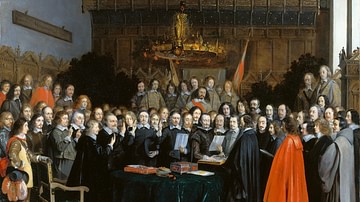
Definition
Peace of Westphalia
The Peace of Westphalia, the name given to the multiple treaties, marked the conclusion of the Thirty Years' War. Signed on 24 October 1648, it aimed to secure political autonomy for the multitude of small states that made up the Holy Roman...

Article
The Monastic Movement: Origins & Purposes
In 313 CE, Constantine the Great (272 – 337 CE) ended the sporadic-yet-terrifying Christian persecutions under the Roman Empire with his “Edict of Milan,” and brought the Christian church under imperial protection. Not surprisingly, public...

Definition
Peace of Callias
The Peace of Callias (aka Kallias) refers to a possible peace treaty made in the mid-5th century BCE between Athens and Persia following the Persian Wars. The existence of such a treaty is not agreed upon by all historians, and if it did...
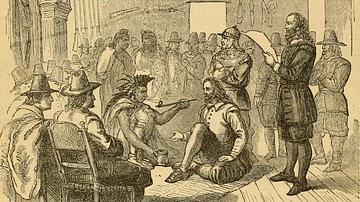
Definition
Pilgrim-Wampanoag Peace Treaty
The Pilgrim-Wampanoag Peace Treaty is the document drafted and signed on 22 March 1621 CE between governor John Carver (l. 1584-1621 CE) of the Plymouth Colony and the sachem (chief) Ousamequin (better known by his title Massasoit, l. c...
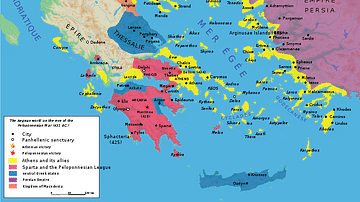
Article
The Delian League, Part 2: From Eurymedon to the Thirty Years Peace (465/4-445/4 BCE)
This text is part of an article series on the Delian League. The second phase of the Delian League's operations begins with the Hellenic victory over Mede forces at Eurymedon and ends with the Thirty Years Peace between Athens and Sparta...
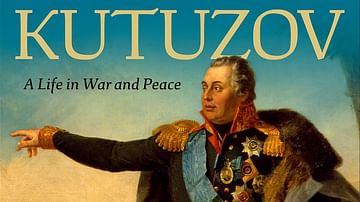
Interview
Interview: Kutuzov a Life in War and Peace by Alexander Mikaberidze
Join World History Encyclopedia as they have a chat with author Alexander Mikaberidze all about his new book Kutuzov: A Life in War and Peace, published by Oxford University Press. Kelly: Thank you so much for joining me today, Alex. It...
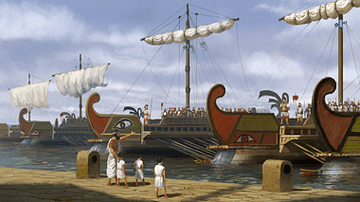
Article
The Delian League, Part 5: The Peace of Nicias, Quadruple Alliance, and Sicilian Expedition (421/0-413/2 BCE)
This text is part of an article series on the Delian League. The fifth phase of the Delian League begins with the Peace of Nicias – a settlement that settled nothing – and ends with the start of the Decelean War (also referred to as the...
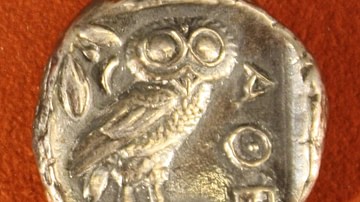
Article
The Delian League, Part 3: From the Thirty Years Peace to the Start of the Ten Years War (445/4–431/0 BCE)
This text is part of an article series on the Delian League. The third phase of the Delian League begins with the Thirty Years Peace between Athens and Sparta and ends with the start of the Ten Years War (445/4 – 431/0 BCE). The First Peloponnesian...
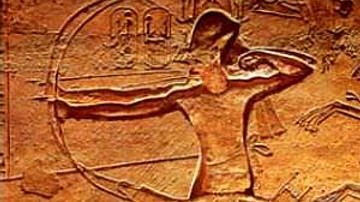
Article
The Battle of Kadesh & the First Peace Treaty
Ramesses II (The Great, 1279-1213 BCE) ruled Egypt for 67 years and, today, the Egyptian landscape still bears testimony to the prosperity of his reign in the many temples and monuments he had built in honor of his conquests and accomplishments...
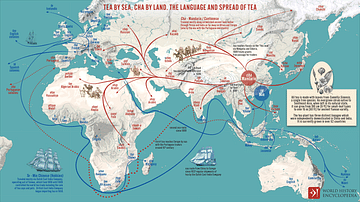
Image
Movement of "Tea" & "Cha" Around the Globe
This map shows the phenomena of the movement of tea, and what it's called around the globe. Around the world, there are mainly 2 root words for tea, 'te' and 'cha', and both of these come from China. Where the use of ‘cha’ occurred through...